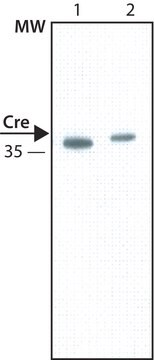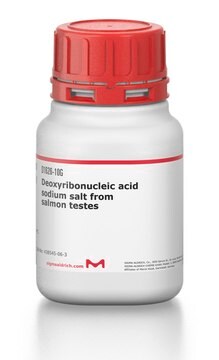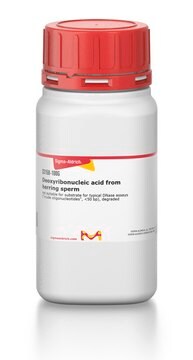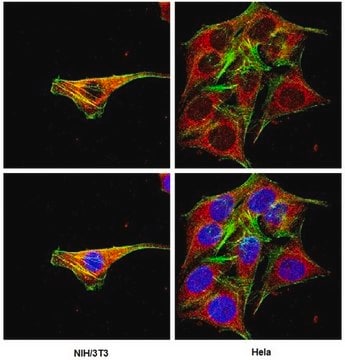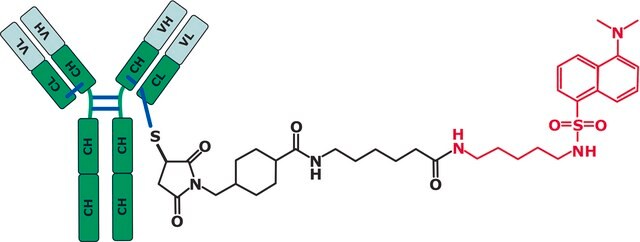D2001
Deoxyribonucleic acid sodium salt from Escherichia coli strain B
Type VIII
Sinónimos:
DNA
Iniciar sesiónpara Ver la Fijación de precios por contrato y de la organización
About This Item
Número de CAS:
Número CE:
Número MDL:
Código UNSPSC:
41106305
eCl@ss:
32160414
NACRES:
NA.51
Productos recomendados
¿Está buscando productos similares? Visita Guía de comparación de productos
Categorías relacionadas
Aplicación
Escherichia coli DNA has many uses in research. Escherichia coli DNA (ecDNA) is used in studies of DNA binding agents that modulate DNA structure and function. E. coli DNA is used in physicochemical studies of DNA behavior in solution, and to evaluate species-specific DNA structures and binding domains. This DNA is particularly useful for genomic analysis, including PCR, library construction in bacteriophage lambda, and in heterologous pre-hybridization and hybridization protocols.
Deoxyribonucleic acid sodium salt from Escherichia coli strain B has been used to measure the melting temperature (Tm) and in differential scanning calorimetry (DSC) studies. It has also been used as a template sequence in the polymerase chain reaction (PCR).
Nota de preparación
Prepared by procedure of Marmur, J., J. Mol. Biol., 3, 208 (1961).
Código de clase de almacenamiento
11 - Combustible Solids
Clase de riesgo para el agua (WGK)
WGK 3
Punto de inflamabilidad (°F)
Not applicable
Punto de inflamabilidad (°C)
Not applicable
Equipo de protección personal
Eyeshields, Gloves, type N95 (US)
Certificados de análisis (COA)
Busque Certificados de análisis (COA) introduciendo el número de lote del producto. Los números de lote se encuentran en la etiqueta del producto después de las palabras «Lot» o «Batch»
¿Ya tiene este producto?
Encuentre la documentación para los productos que ha comprado recientemente en la Biblioteca de documentos.
R Richins et al.
Biotechnology progress, 17(2), 252-257 (2001-04-21)
The Escherichia coli DNA binding protein FIS is a transcriptional modulator involved in the regulation of many cellular processes, including the activation of rRNA synthesis. High-level overproduction of FIS in early, mid, or late log cultures resulted in growth-phase- and
William G Dundon et al.
International journal of medical microbiology : IJMM, 291(6-7), 545-550 (2002-03-14)
Infection of the stomach mucosa by the gastric pathogen Helicobacter pylori is accompanied by a large infiltration of neutrophils and monocytes which are believed to contribute substantially to H. pylori-induced gastritis. A protein was identified (HP-NAP for neutrophil-activating protein from
Geoffrey S Briggs et al.
The Journal of biological chemistry, 282(17), 12353-12357 (2007-02-20)
The DNA-binding protein, RdgC, is associated with recombination and replication fork repair in Escherichia coli and with the virulence-associated, pilin antigenic variation mediated by RecA and other recombination proteins in Neisseria species. We solved the structure of the E. coli
Mitsumasa Hashimoto et al.
The Journal of biological chemistry, 278(31), 28501-28507 (2003-05-16)
Closely opposed lesions form a unique class of DNA damage that is generated by ionizing radiation. Improper repair of closely opposed lesions could lead to the formation of double strand breaks that can result in increased lethality and mutagenesis. In
Differential scanning calorimetry of bacteria
Miles CA, et al.
Microbiology, 132(4), 939-952 (1986)
Nuestro equipo de científicos tiene experiencia en todas las áreas de investigación: Ciencias de la vida, Ciencia de los materiales, Síntesis química, Cromatografía, Analítica y muchas otras.
Póngase en contacto con el Servicio técnico
